Quotes & Sayings About Occam's Razor
Enjoy reading and share 25 famous quotes about Occam's Razor with everyone.
Top Occam's Razor Quotes
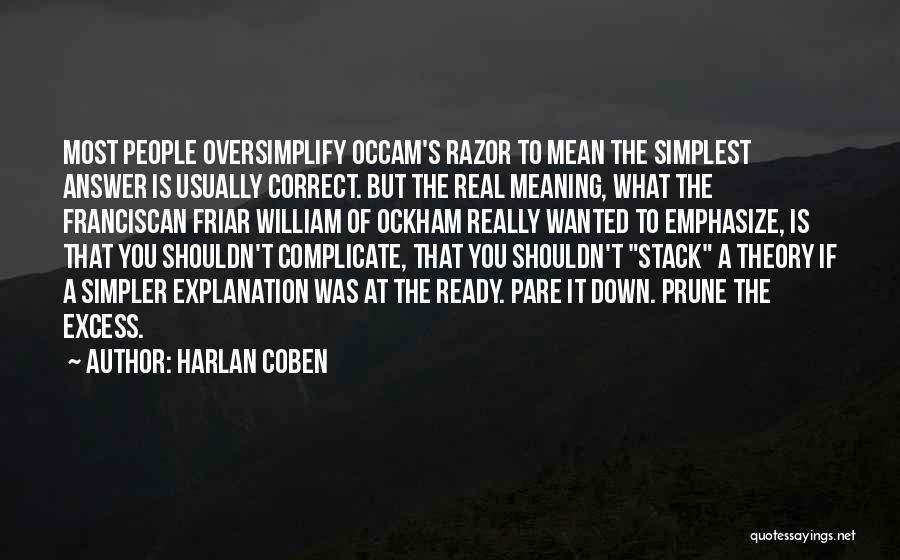
Most people oversimplify Occam's razor to mean the simplest answer is usually correct. But the real meaning, what the Franciscan friar William of Ockham really wanted to emphasize, is that you shouldn't complicate, that you shouldn't "stack" a theory if a simpler explanation was at the ready. Pare it down. Prune the excess. — Harlan Coben

While Occam's razor is a useful tool in the physical sciences, it can be a very dangerous implement in biology. It is thus very rash to use simplicity and elegance as a guide in biological research. — Francis Crick

Occam's razor: The simplest explanation that accommodates all variables is most likely the truth. — Karen Marie Moning
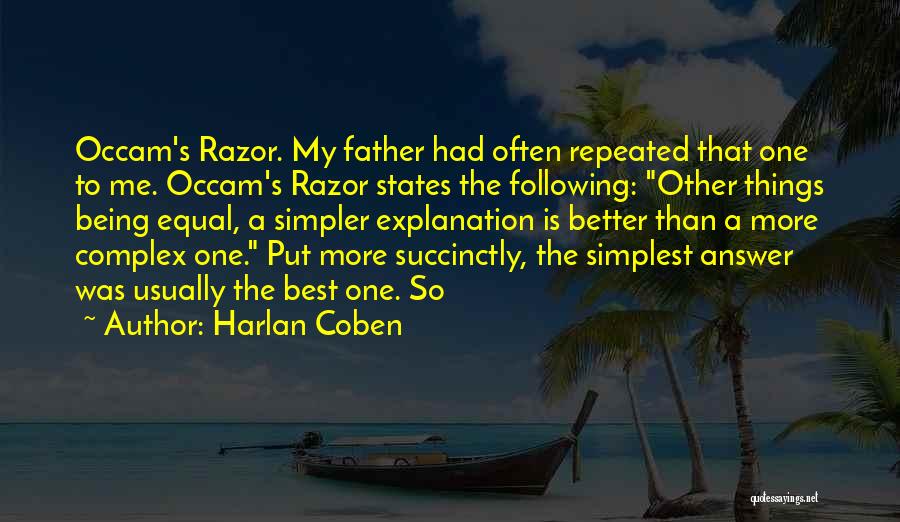
Occam's Razor. My father had often repeated that one to me. Occam's Razor states the following: "Other things being equal, a simpler explanation is better than a more complex one." Put more succinctly, the simplest answer was usually the best one. So — Harlan Coben

You know how I feel about Occam's Razor. The simplest answer isn't usually the right one. Devious and unlikely is everywhere.' 'You ought to launch your own theory: Occam's Beard, you could call it. — Sophie Hannah

Least hypothesis held no place of preference; Occam's razor could not slice the prime problem, the Nature of the Mind of God (might as well call it that to yourself, you old scoundrel; it's a short, simple, Anglo-Saxon monosyllable, not banned by having four letters - and as good a tag for what you don't understand as any). — Robert A. Heinlein
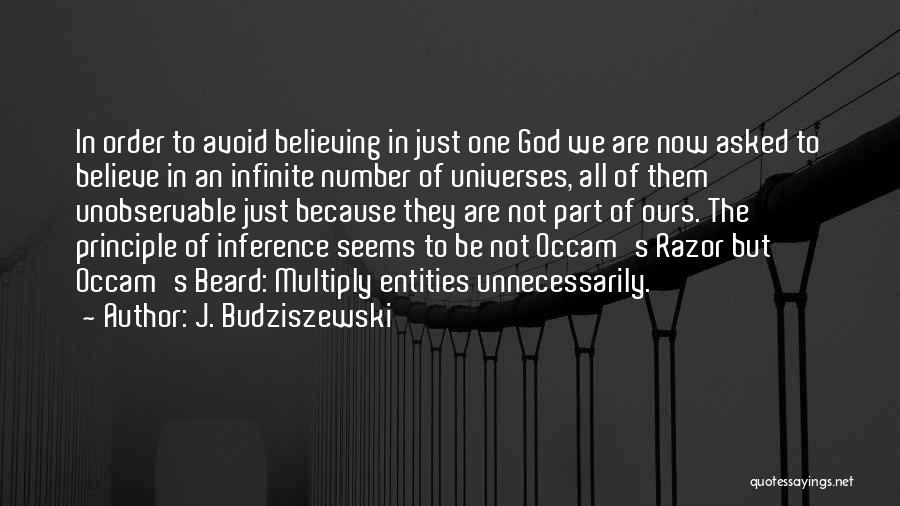
In order to avoid believing in just one God we are now asked to believe in an infinite number of universes, all of them unobservable just because they are not part of ours. The principle of inference seems to be not Occam's Razor but Occam's Beard: Multiply entities unnecessarily. — J. Budziszewski
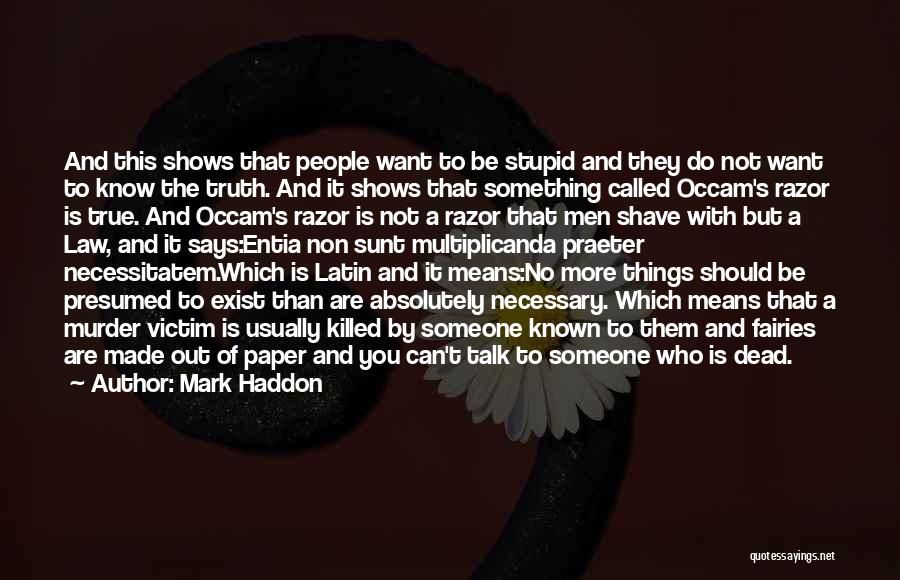
And this shows that people want to be stupid and they do not want to know the truth. And it shows that something called Occam's razor is true. And Occam's razor is not a razor that men shave with but a Law, and it says:
Entia non sunt multiplicanda praeter necessitatem.
Which is Latin and it means:
No more things should be presumed to exist than are absolutely necessary.
Which means that a murder victim is usually killed by someone known to them and fairies are made out of paper and you can't talk to someone who is dead. — Mark Haddon

Occam's razor theory of combat: The simplest way of kicking someone's ass was usually the correct one. — John Scalzi
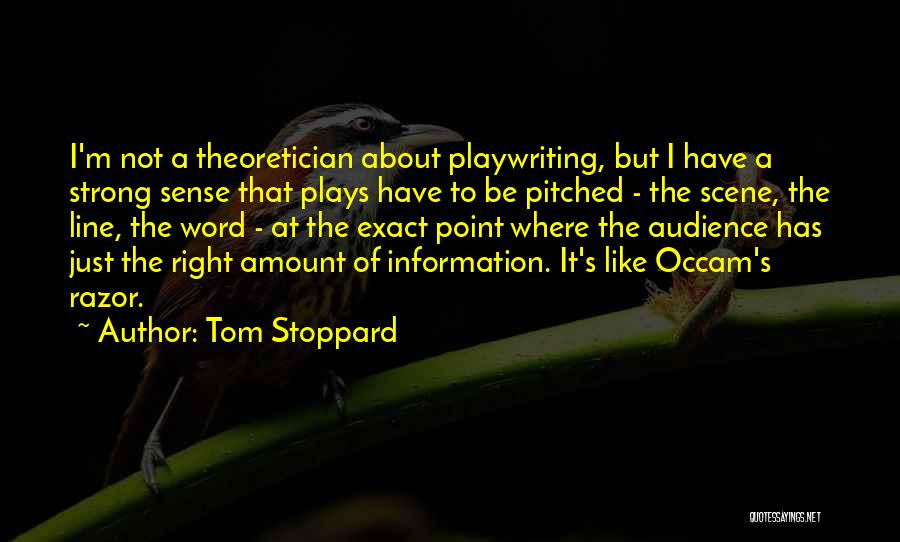
I'm not a theoretician about playwriting, but I have a strong sense that plays have to be pitched - the scene, the line, the word - at the exact point where the audience has just the right amount of information. It's like Occam's razor. — Tom Stoppard

Nonbeing must in some sense be, otherwise what is it that there is not? This tangled doctrine might be nicknamed Plato's beard; historically it has proved tough, frequently dulling the edge of Occam's razor. — Willard Van Orman Quine

Shave you mind with occam's razor everyday — Paul Grimsley

Simple is never that simple. — Philip Roth
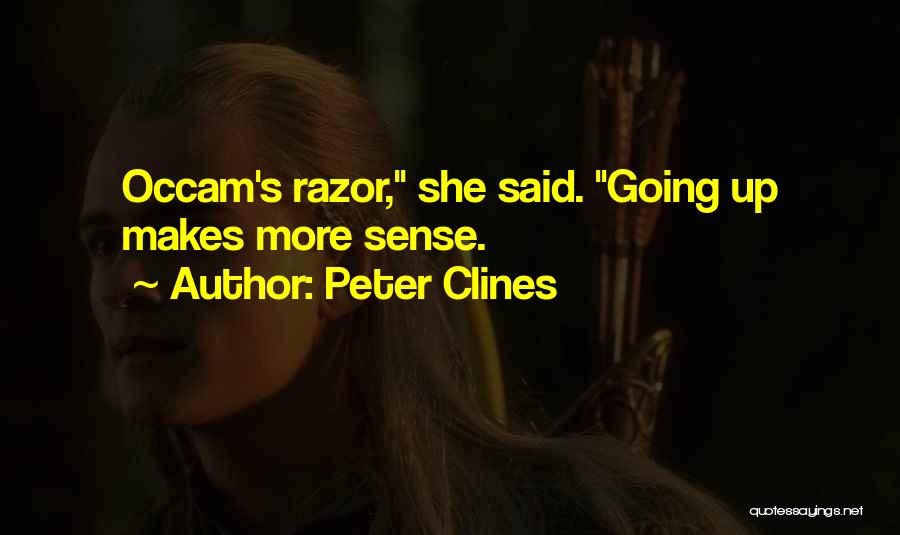
Occam's razor," she said. "Going up makes more sense. — Peter Clines
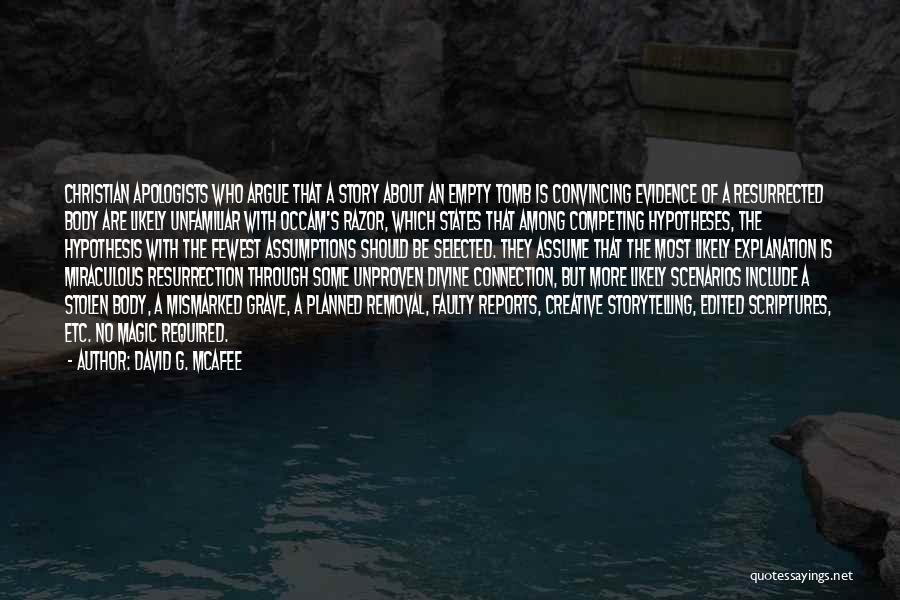
Christian apologists who argue that a story about an empty tomb is convincing evidence of a resurrected body are likely unfamiliar with Occam's razor, which states that among competing hypotheses, the hypothesis with the fewest assumptions should be selected. They assume that the most likely explanation is miraculous resurrection through some unproven divine connection, but more likely scenarios include a stolen body, a mismarked grave, a planned removal, faulty reports, creative storytelling, edited scriptures, etc. No magic required. — David G. McAfee

Occam's Razor shaves you closer. — Hilary Mantel

With Occam's old razor she could slit the throat of that idea. — John Crowley
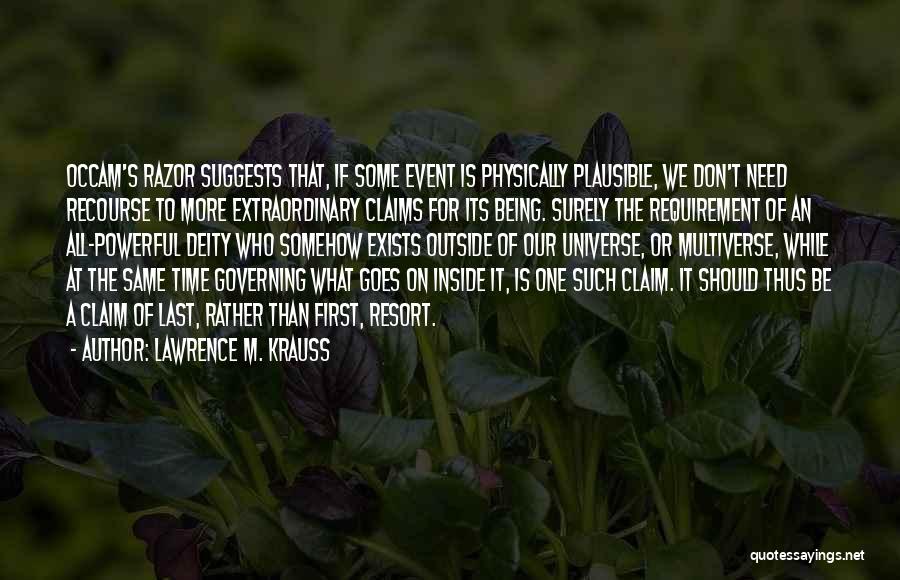
Occam's razor suggests that, if some event is physically plausible, we don't need recourse to more extraordinary claims for its being. Surely the requirement of an all-powerful deity who somehow exists outside of our universe, or multiverse, while at the same time governing what goes on inside it, is one such claim. It should thus be a claim of last, rather than first, resort. — Lawrence M. Krauss
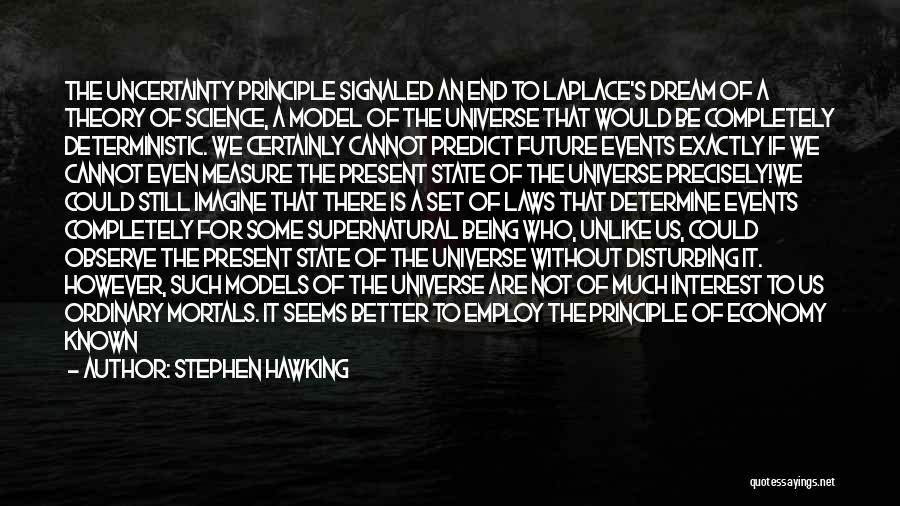
The uncertainty principle signaled an end to Laplace's dream of a theory of science, a model of the universe that would be completely deterministic. We certainly cannot predict future events exactly if we cannot even measure the present state of the universe precisely!
We could still imagine that there is a set of laws that determine events completely for some supernatural being who, unlike us, could observe the present state of the universe without disturbing it. However, such models of the universe are not of much interest to us ordinary mortals. It seems better to employ the principle of economy known as Occam's razor and cut out all the features of the theory that cannot be observed. — Stephen Hawking

Let's Look at Subjective Religious Experiences This Way:
What if ten thousand people went up to a mountain top, saw something, and then they all disagreed with what they saw, even people who largely agreed with each other? Even with this best possible analogy to subjective religious experiences we would still have a reason to think the lack of oxygen caused them all to hallucinate. — John W. Loftus
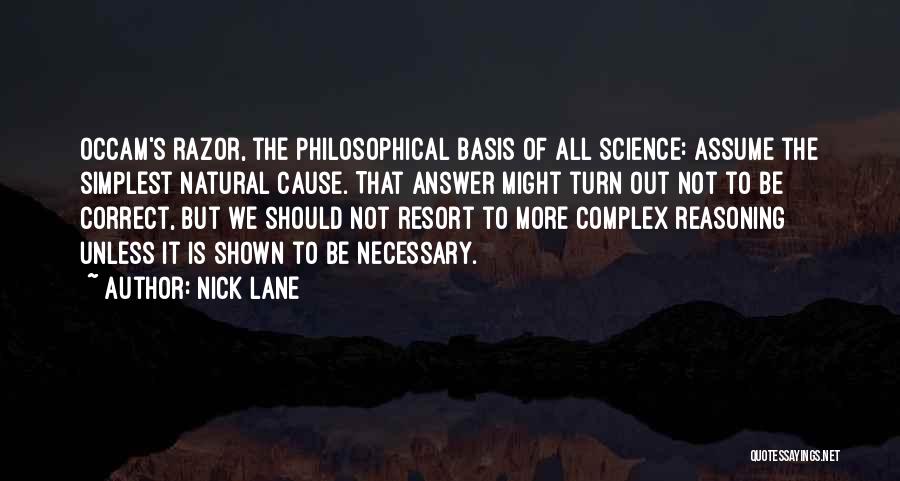
Occam's razor, the philosophical basis of all science: assume the simplest natural cause. That answer might turn out not to be correct, but we should not resort to more complex reasoning unless it is shown to be necessary. — Nick Lane
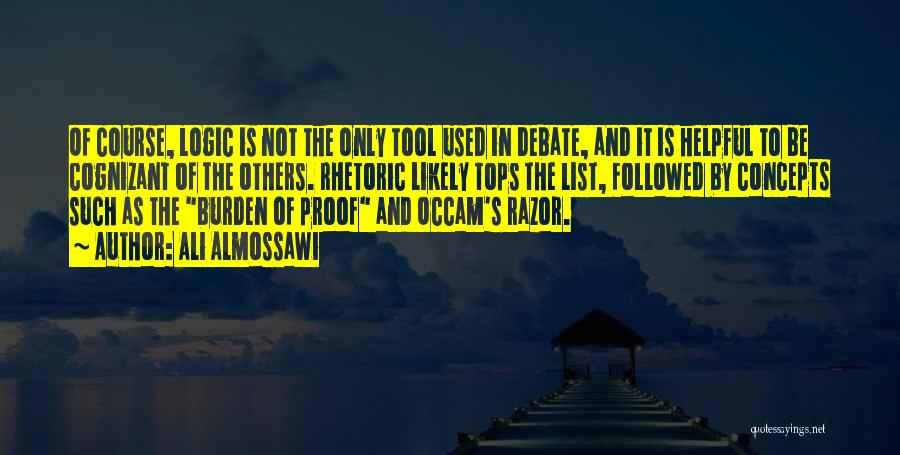
Of course, logic is not the only tool used in debate, and it is helpful to be cognizant of the others. Rhetoric likely tops the list, followed by concepts such as the "burden of proof" and Occam's razor. — Ali Almossawi
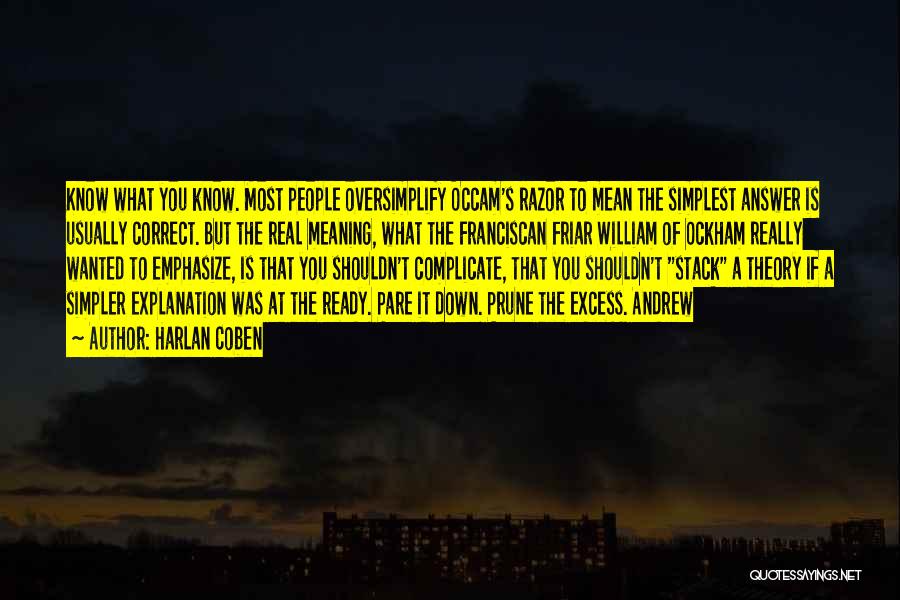
Know what you know. Most people oversimplify Occam's razor to mean the simplest answer is usually correct. But the real meaning, what the Franciscan friar William of Ockham really wanted to emphasize, is that you shouldn't complicate, that you shouldn't "stack" a theory if a simpler explanation was at the ready. Pare it down. Prune the excess. Andrew — Harlan Coben
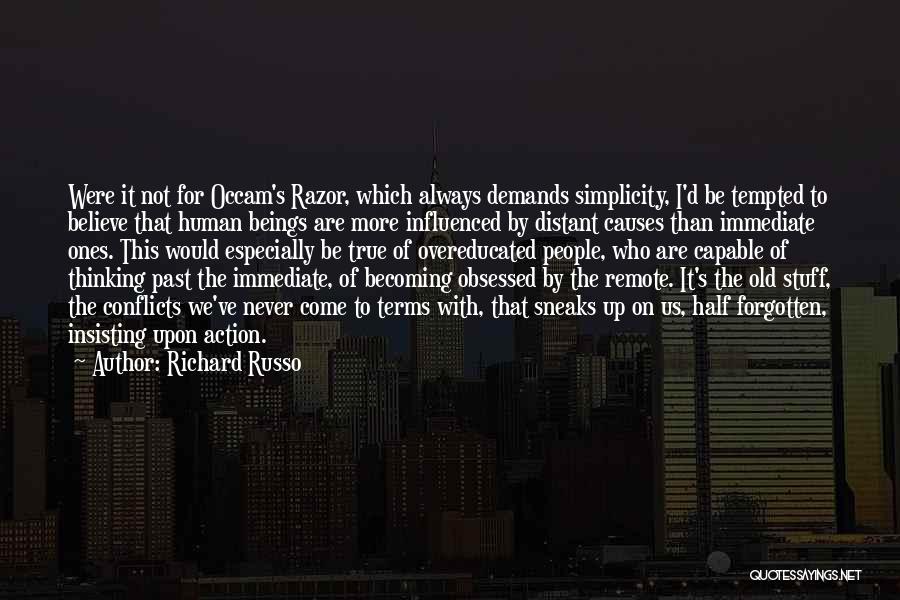
Were it not for Occam's Razor, which always demands simplicity, I'd be tempted to believe that human beings are more influenced by distant causes than immediate ones. This would especially be true of overeducated people, who are capable of thinking past the immediate, of becoming obsessed by the remote. It's the old stuff, the conflicts we've never come to terms with, that sneaks up on us, half forgotten, insisting upon action. — Richard Russo

People often tell themselves lies, in order to reach what they consider acceptance in difficult situations. In reality, they fool themselves into believing they are healed, until that lie is corrected by time, further information or their own personal growth. True healing comes when we learn to not avoid truth, but face it. Only then will we be set free. — Shannon L. Alder





